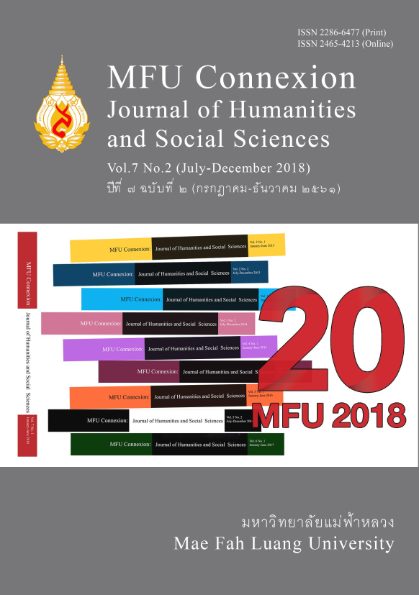The Utilization of Storytelling for Enhancing Selling Skills Training (in Thai)
Main Article Content
Abstract
This is an experimental research to study the use of storytelling and to compare the result between storytelling and training to enhance selling skills for 20 Financial Advisors of Public Securities Companies in Thailand. The experimental group consisted of 20 people divided into 4 groups, with the first-three groups are experimental group. The last group served as a control group. The results found that group 3 who participated in storytelling had a higher percentage of performance change than group 1 who participated in training. Group 2, who participated in storytelling and training had the highest percentage of change in performance. The last group as a control group who did not go through any learning process had the slightest change in performance.
Article Details
Copyright
Connexion: Journal of Humanities and Social Sciences has an exclusive right to publish the accepted articles in any form. However, the author retains the following rights:
1. The right to the ownership of the article;
2. The right to use all or part of the article in his/her other works;
3. The right to re-produce the article for personal use or for use in the author’s organisation, in which case the author must obtain permission from Connexion: Journal of Humanities and Social Sciences;
4. The right to make copies of all or part of the work for educational use or for the author’s use in classroom teaching; and
5. The right to include the work (both the preprinted and printed versions) in an institutional repository.
References
Becerra-Fernandez, I., et al. (2004) Knowledge management challenges, solutions and technologies, New Jersey: Pearson Education.
Blanchard, P. N., & Thacker, J. W. (2003) Effective training: Systems, strategies, and practices, 2nd edition, Upper Saddle River, NJ: Pearson Prentice Hall.
Chantawimon, P. (2013) Development of a blended training model with knowledge management and action learning principles to develop training program design competencies of personnel development staff (การพัฒนารูปแบบการฝึกอบรมแบบผสมผสานโดยใช้หลักการจัดการความรู้ และการเรียนรู้จากการปฏิบัติ เพื่อพัฒนาสมรรถนะการออกแบบการฝึกอบรมของนักพัฒนาบุคลากร), Master’s thesis of Science in Sports and Exercise Science, Chulalongkorn University. (in Thai)
Chatviroj, B. (2007) The development of a knowledge management learning model to enhance student teachers’ teaching competencies (การพัฒนารูปแบบการจัดการเรียนการสอนแบบการจัดการความรู้เพื่อเสริมสร้างสมรรถนะการสอนของนักศึกษาครู), Doctoral dissertation in Educational Technology and Communications, Chulalongkorn University. (in Thai)
Denning, S. (2004) Telling tales, Harvard Business Review, vol. 82, no. 5, pp. 122-129.
Flippo, E. B. (1961) Principle of personnel management, New York: McGraw-Hill.
Handy, S. A., & Polimeni, R. S. (2015) Engaging student-use of article of active learning activities to enhance student learning in an introductory managerial accounting course, Journal of Applied Research for Business Instruction, vol. 13, no. 3, pp. 1-8.
Khairul, S. K., & Ahmad, K. M. (2016) The development of a storytelling framework to support knowledge management processes, Journal of Theoretical and Applied Information Technology, vol. 90, no. 1, pp. 12-22.
Khajornnan, N. (1998) Human resources management (การจัดการทรัพยากรบุคคล), Bangkok: Chulalongkorn University Printing House. (in Thai)
Kijbanyong, S. (2000) Successful salesmanship (เทคนิคการขายที่ประสบความสำเร็จ), Bangkok: Teera Pom Wannagam Printing. (in Thai)
Mamabolo, K. A. (2014) Knowledge by narration: The role of storytelling in knowledge management, Stellenbosch, South Africa: Stellenbosch University.
Martin, B. O., et al. (2014) Training methods: A review and analysis, Human Resource Development Review, vol. 13, no. 1, pp. 11-15.
Nonaka, I. (1995) A dynamic theory of organizational knowledge creation, The Institute of Management Sciences, vol. 5, no. 1, pp. 14-37.
Panich, V. (2006) Knowledge management in practices (การจัดการความรู้ฉบับนักปฏิบัติ), Bangkok: Sukapab Jai Printing. (in Thai)
Phuwitayapan, A. (2008) Human resource development strategy (กลยุทธ์การพัฒนาทรัพยากรมนุษย์), Bangkok: HR Center Printing. (in Thai)
Rooney, T., et al. (2016) Telling tales: Storytelling as a methodological approach in research, The Electronic Journal of Business Research Methods, vol. 14, no. 2, pp. 147-156.
Rungruengrit, T., & Sorakraikitikul, M. (2017) An experimental study in enhancing knowledge of provident fund (การทดลองเพื่อเสริมสร้างความรู้เกี่ยวกับกองทุนสำรองเลี้ยงชีพ), Journal of Business, Economics and Communications: BEC Journal, vol. 12, no. 1, pp. 45-54. (in Thai)
Sukamolson, S. (2010) Effect size: A significant in research (ขนาดของผล: ความมีนัยสำคัญทางปฏิบัติในการวิจัย), Pasaa Paritat Journal, vol. 25, pp. 26-38. (in Thai)
Sirirojanan, A. (2009) Professional salesman (นักขายมืออาชีพ), Bangkok: T. B. K. Media Publishing. (in Thai)
Thongsudjaritkul, S., et al. (2008) Talent retention: Board of director, true visions public company limited (การรักษาผู้มีศักยภาพ: กรณีศึกษากลุ่มผู้บริหาร บริษัท ทรู วิชั่นส์ จำกัด (มหาชน)), Independent Study in Business Administration, Thammasat University. (in Thai)
Vanichbuncha, K. (2002) Statistics (หลักสถิติ), 7th edition, Bangkok: Chulalongkorn University Printing House. (in Thai)
Wichienpanya, J. (2006) Development of efficient knowledge management composite indicators (การพัฒนาตัวบ่งชี้รวมสำหรับการจัดการความรู้ที่มีประสิทธิภาพ), Doctoral dissertation in Education, Chulalongkorn University. (in Thai)


